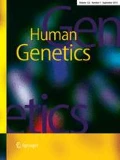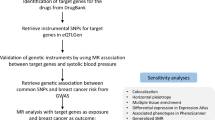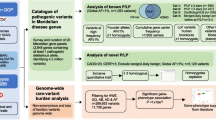Abstract
Endometriosis, polycystic ovary syndrome (PCOS) and uterine fibroids have been proposed as endometrial cancer risk factors; however, disentangling their relationships with endometrial cancer is complicated due to shared risk factors and comorbidities. Using genome-wide association study (GWAS) data, we explored the relationships between these non-cancerous gynecological diseases and endometrial cancer risk by assessing genetic correlation, causal relationships and shared risk loci. We found significant genetic correlation between endometrial cancer and PCOS, and uterine fibroids. Adjustment for genetically predicted body mass index (a risk factor for PCOS, uterine fibroids and endometrial cancer) substantially attenuated the genetic correlation between endometrial cancer and PCOS but did not affect the correlation with uterine fibroids. Mendelian randomization analyses suggested a causal relationship between only uterine fibroids and endometrial cancer. Gene-based analyses revealed risk regions shared between endometrial cancer and endometriosis, and uterine fibroids. Multi-trait GWAS analysis of endometrial cancer and the genetically correlated gynecological diseases identified a novel genome-wide significant endometrial cancer risk locus at 1p36.12, which replicated in an independent endometrial cancer dataset. Interrogation of functional genomic data at 1p36.12 revealed biologically relevant genes, including WNT4 which is necessary for the development of the female reproductive system. In summary, our study provides genetic evidence for a causal relationship between uterine fibroids and endometrial cancer. It further provides evidence that the comorbidity of endometrial cancer, PCOS and uterine fibroids may partly be due to shared genetic architecture. Notably, this shared architecture has revealed a novel genome-wide risk locus for endometrial cancer.



Similar content being viewed by others
Availability of data and material (data transparency)
Summary-level GWAS meta-analysis results for PCOS, uterine fibroids and endometrial cancer that support the findings of this study are available at the NHGRI-EBI GWAS Catalog (https://www.ebi.ac.uk/gwas/downloads/summary-statistics). Other data generated during this study are included in this article and its supplementary information files or are available on reasonable request.
Code availability
Not applicable.
References
Agarwal SK et al (2019) Clinical diagnosis of endometriosis: a call to action. Am J Obstet Gynecol 220:354 e351-354 e312. https://doi.org/10.1016/j.ajog.2018.12.039
Alnafakh RAA, Adishesh M, Button L, Saretzki G, Hapangama DK (2019) Telomerase and telomeres in endometrial cancer front. Oncol 9:344. https://doi.org/10.3389/fonc.2019.00344
Azziz R, Dumesic DA, Goodarzi MO (2011) Polycystic ovary syndrome: an ancient disorder? Fertil Steril 95:1544–1548. https://doi.org/10.1016/j.fertnstert.2010.09.032
Bakshi A, Zhu Z, Vinkhuyzen AA, Hill WD, McRae AF, Visscher PM, Yang J (2016) Fast set-based association analysis using summary data from GWAS identifies novel gene loci for human complex. Traits Sci Rep 6:32894. https://doi.org/10.1038/srep32894
Biason-Lauber A (2012) WNT4, RSPO1, and FOXL2 in sex development. Semin Reprod Med 30:387–395. https://doi.org/10.1055/s-0032-1324722
Biason-Lauber A, Konrad D (2008) WNT4 and sex development. Sex Dev 2:210–218. https://doi.org/10.1159/000152037
Bonatz G, Frahm SO, Andreas S, Heidorn K, Jonat W, Parwaresch R (1998) Telomere shortening in uterine leiomyomas. Am J Obstet Gynecol 179:591–596. https://doi.org/10.1016/s0002-9378(98)70050-x
Bowden J, Davey Smith G, Burgess S (2015) Mendelian randomization with invalid instruments: effect estimation and bias detection through Egger regression. Int J Epidemiol 44:512–525. https://doi.org/10.1093/ije/dyv080
Bowden J, Davey Smith G, Haycock PC, Burgess S (2016) Consistent estimation in Mendelian randomization with some invalid instruments using a weighted median estimator. Genet Epidemiol 40:304–314. https://doi.org/10.1002/gepi.21965
Bowden J, Hemani G, Davey Smith G (2018) Invited Commentary: detecting individual and global horizontal pleiotropy in mendelian randomization: a job for the humble heterogeneity statistic? Am J Epidemiol 187:2681–2685. https://doi.org/10.1093/aje/kwy185
Bugter JM, Fenderico N, Maurice MM (2021) Mutations and mechanisms of WNT pathway tumour suppressors in cancer. Nat Rev Cancer 21:5–21. https://doi.org/10.1038/s41568-020-00307-z
Bulik-Sullivan B et al (2015) An atlas of genetic correlations across human diseases and traits. Nat Genet 47:1236–1241. https://doi.org/10.1038/ng.3406
Cancer Genome Atlas Research N et al (2013) Integrated genomic characterization of endometrial carcinoma. Nature 497:67–73. https://doi.org/10.1038/nature12113
Carvajal-Carmona LG et al (2015) Candidate locus analysis of the TERT-CLPTM1L cancer risk region on chromosome 5p15 identifies multiple independent variants associated with endometrial cancer risk. Hum Genet 134:231–245. https://doi.org/10.1007/s00439-014-1515-4
Chang CC, Chow CC, Tellier LC, Vattikuti S, Purcell SM, Lee JJ (2015) Second-generation PLINK: rising to the challenge of larger and richer datasets. Gigascience 4:7. https://doi.org/10.1186/s13742-015-0047-8
Choi EJ, Cho SB, Lee SR, Lim YM, Jeong K, Moon HS, Chung H (2017) Comorbidity of gynecological and non-gynecological diseases with adenomyosis and endometriosis. Obstetr Gynecol Sci 60:579–586. https://doi.org/10.5468/ogs.2017.60.6.579
Day F et al (2018) Large-scale genome-wide meta-analysis of polycystic ovary syndrome suggests shared genetic architecture for different diagnosis criteria. PLoS Genet 14:e1007813. https://doi.org/10.1371/journal.pgen.1007813
De La Cruz MS, Buchanan EM (2017) Uterine fibroids: diagnosis and treatment. Am Fam Physician 95:100–107
Fearnley EJ, Marquart L, Spurdle AB, Weinstein P, Webb PM, Australian Ovarian Cancer Study G, Australian National Endometrial Cancer Study G (2010) Polycystic ovary syndrome increases the risk of endometrial cancer in women aged less than 50 years: an Australian case-control study. Cancer Causes Control 21:2303–2308. https://doi.org/10.1007/s10552-010-9658-7
Fortuny J et al (2009) Risk of endometrial cancer in relation to medical conditions and medication use. Cancer Epidemiol Biomark Prev 18:1448–1456. https://doi.org/10.1158/1055-9965.EPI-08-0936
Gallagher CS et al (2019) Genome-wide association and epidemiological analyses reveal common genetic origins between uterine leiomyomata and endometriosis. Nat Commun 10:4857. https://doi.org/10.1038/s41467-019-12536-4
Gao F, Zhang J, Wang X, Yang J, Chen D, Huff V, Liu YX (2014) Wt1 functions in ovarian follicle development by regulating granulosa cell differentiation. Hum Mol Genet 23:333–341. https://doi.org/10.1093/hmg/ddt423
Gao J, Dai C, Yu X, Yin XB, Zhou F (2020) Long noncoding RNA LINC00324 exerts protumorigenic effects on liver cancer stem cells by upregulating fas ligand via PU box binding protein. FASEB J 34:5800–5817. https://doi.org/10.1096/fj.201902705RR
Giambartolomei C, Vukcevic D, Schadt EE, Franke L, Hingorani AD, Wallace C, Plagnol V (2014) Bayesian test for colocalisation between pairs of genetic association studies using summary statistics. PLoS Genet 10:e1004383. https://doi.org/10.1371/journal.pgen.1004383
Glubb DM et al (2021) Cross-cancer genome-wide association study of endometrial cancer and epithelial ovarian cancer identifies genetic risk regions associated with risk of both cancers. Cancer Epidemiol Biomark Prev 30:217–228. https://doi.org/10.1158/1055-9965.EPI-20-0739
Harris HR, Terry KL (2016) Polycystic ovary syndrome and risk of endometrial, ovarian, and breast cancer: a systematic review. Fertil Res Pract 2:14. https://doi.org/10.1186/s40738-016-0029-2
Hartwig FP, Davey Smith G, Bowden J (2017) Robust inference in summary data Mendelian randomization via the zero modal pleiotropy assumption. Int J Epidemiol 46:1985–1998. https://doi.org/10.1093/ije/dyx102
Hemani G et al (2018) The MR-Base platform supports systematic causal inference across the human phenome. Elife. https://doi.org/10.7554/eLife.34408
Ilaria S, Marci R (2018) From obesity to uterine fibroids: an intricate network. Curr Med Res Opin 34:1877–1879. https://doi.org/10.1080/03007995.2018.1505606
Johnatty SE et al (2020) Co-existence of leiomyomas, adenomyosis and endometriosis in women with endometrial cancer. Sci Rep 10:3621. https://doi.org/10.1038/s41598-020-59916-1
Kar SP et al (2020) Combining genome-wide studies of breast, prostate, ovarian and endometrial cancers maps cross-cancer susceptibility loci and identifies new genetic associations. BioRxiv. https://doi.org/10.1101/2020.06.16.146803
Kichaev G et al (2019) Leveraging polygenic functional enrichment to improve GWAS power. Am J Hum Genet 104:65–75. https://doi.org/10.1016/j.ajhg.2018.11.008
Kuchenbaecker KB et al (2015) Identification of six new susceptibility loci for invasive epithelial ovarian cancer. Nat Genet 47:164–171. https://doi.org/10.1038/ng.3185
Lareau CA, Aryee MJ (2018) hichipper: a preprocessing pipeline for calling DNA loops from HiChIP data. Nat Methods 15:155–156. https://doi.org/10.1038/nmeth.4583
Li J et al (2019) Impact of endometriosis on risk of ovarian, endometrial and cervical cancers: a meta-analysis. Arch Gynecol Obstet 299:35–46. https://doi.org/10.1007/s00404-018-4968-1
Masuda T et al (2020) GWAS of five gynecologic diseases and cross-trait analysis in Japanese. Eur J Hum Genet 28:95–107. https://doi.org/10.1038/s41431-019-0495-1
Matalliotaki C et al (2018) Co-existence of benign gynecological tumors with endometriosis in a group of 1,000 women. Oncol Lett 15:1529–1532. https://doi.org/10.3892/ol.2017.7449
Mbatchou J et al (2020) Computationally efficient whole genome regression for quantitative and binary traits. bioRxiv 9:25
Melin A, Sparen P, Bergqvist A (2007) The risk of cancer and the role of parity among women with endometriosis. Hum Reprod 22:3021–3026. https://doi.org/10.1093/humrep/dem209
Morris JA et al (2019) An atlas of genetic influences on osteoporosis in humans and mice. Nat Genet 51:258–266. https://doi.org/10.1038/s41588-018-0302-x
Morse EM, Sun X, Olberding JR, Ha BH, Boggon TJ, Calderwood DA (2016) PAK6 targets to cell-cell adhesions through its N-terminus in a Cdc42-dependent manner to drive epithelial colony escape. J Cell Sci 129:380–393. https://doi.org/10.1242/jcs.177493
Mortlock S et al (2020) Tissue specific regulation of transcription in endometrium and association with disease. Hum Reprod 35:377–393. https://doi.org/10.1093/humrep/dez279
Munz M, Wohlers I, Simon E, Reinberger T, Busch H, Schaefer AS, Erdmann J (2020) Qtlizer: comprehensive QTL annotation of GWAS results. Sci Rep 10:20417. https://doi.org/10.1038/s41598-020-75770-7
Nagai K et al (2015) Disease history and risk of comorbidity in women’s life course: a comprehensive analysis of the Japan nurses’ health study baseline survey. BMJ Open 5:e006360. https://doi.org/10.1136/bmjopen-2014-006360
Olafsdottir T et al (2020) Genome-wide association identifies seven loci for pelvic organ prolapse in iceland and the UK biobank. Commun Biol 3:129. https://doi.org/10.1038/s42003-020-0857-9
Olson JE, Cerhan JR, Janney CA, Anderson KE, Vachon CM, Sellers TA (2002) Postmenopausal cancer risk after self-reported endometriosis diagnosis in the Iowa Women’s Health Study. Cancer 94:1612–1618
O’Mara TA et al (2018) Identification of Nine New Susceptibility Loci for Endometrial. Cancer Nat Commun 9:3166. https://doi.org/10.1038/s41467-018-05427-7
O’Mara TA, Spurdle AB, Glubb DM, Endometrial Cancer Association C (2019) Analysis of promoter-associated chromatin interactions reveals biologically relevant candidate target genes at endometrial cancer risk loci. Cancers (basel). https://doi.org/10.3390/cancers11101440
Painter JN et al (2018) Genetic overlap between endometriosis and endometrial cancer: evidence from cross-disease genetic correlation and GWAS meta-analyses. Cancer Med. https://doi.org/10.1002/cam4.1445
Parasar P, Ozcan P, Terry KL (2017) Endometriosis: epidemiology, diagnosis and clinical management. Curr Obstet Gynecol Rep 6:34–41. https://doi.org/10.1007/s13669-017-0187-1
Powell JE et al (2016) Endometriosis risk alleles at 1p36.12 act through inverse regulation of CDC42 and LINC00339. Hum Mol Genet 25:5046–5058. https://doi.org/10.1093/hmg/ddw320
Pulit SL et al (2019) Meta-analysis of genome-wide association studies for body fat distribution in 694 649 individuals of European ancestry. Hum Mol Genet 28:166–174. https://doi.org/10.1093/hmg/ddy327
Qadir MI, Parveen A, Ali M (2015) Cdc42: role in cancer management. Chem Biol Drug Des 86:432–439. https://doi.org/10.1111/cbdd.12556
Rafnar T et al (2018) Variants associating with uterine leiomyoma highlight genetic background shared by various cancers and hormone-related traits. Nat Commun 9:3636. https://doi.org/10.1038/s41467-018-05428-6
Rahmioglu N et al (2018) Large-scale genome-wide association meta-analysis of endometriosis reveals 13 novel loci and genetically-associated comorbidity with other pain conditions. bioRxiv. https://doi.org/10.1101/406967
Roberts SG (2005) Transcriptional regulation by WT1 in development. Curr Opin Genet Dev 15:542–547. https://doi.org/10.1016/j.gde.2005.08.004
Rogalla P, Rohen C, Hennig Y, Deichert U, Bonk U, Bullerdiek J (1995) Telomere repeat fragment sizes do not limit the growth potential of uterine leiomyomas. Biochem Biophys Res Commun 211:175–182. https://doi.org/10.1006/bbrc.1995.1793
Rowlands IJ, Nagle CM, Spurdle AB, Webb PM, Australian National Endometrial Cancer Study G, Australian Ovarian Cancer Study G (2011) Gynecological conditions and the risk of endometrial cancer. Gynecol Oncol 123:537–541. https://doi.org/10.1016/j.ygyno.2011.08.022
Rubtsova MP, Vasilkova DP, Malyavko AN, Naraikina YV, Zvereva MI, Dontsova OA (2012) Telomere lengthening and other functions of telomerase. Acta Nat 4:44–61
Sam S (2007) Obesity and polycystic ovary syndrome. Obes Manag 3:69–73. https://doi.org/10.1089/obe.2007.0019
Sapkota Y et al (2017) Meta-analysis identifies five novel loci associated with endometriosis highlighting key genes involved in hormone metabolism. Nat Commun 8:15539. https://doi.org/10.1038/ncomms15539
Stewart EA, Cookson CL, Gandolfo RA, Schulze-Rath R (2017) Epidemiology of uterine fibroids: a systematic review. BJOG 124:1501–1512. https://doi.org/10.1111/1471-0528.14640
Telomeres Mendelian Randomization C et al (2017) Association between telomere length and risk of cancer and non-neoplastic diseases: a mendelian randomization study. JAMA Oncol 3:636–651. https://doi.org/10.1001/jamaoncol.2016.5945
Turley P et al (2018) Multi-trait analysis of genome-wide association summary statistics using MTAG. Nat Genet 50:229–237. https://doi.org/10.1038/s41588-017-0009-4
Uimari O, Jarvela I, Ryynanen M (2011) Do symptomatic endometriosis and uterine fibroids appear together? J Hum Reprod Sci 4:34–38. https://doi.org/10.4103/0974-1208.82358
Vujkovic M et al (2020) Discovery of 318 new risk loci for type 2 diabetes and related vascular outcomes among 1.4 million participants in a multi-ancestry meta-analysis. Nat Genet 52:680–691. https://doi.org/10.1038/s41588-020-0637-y
Wang G, Sarkar A, Carbonetto P, Stephens M (2020) A simple new approach to variable selection in regression, with application to genetic fine mapping. J R Stat Soc B 82:1273–1300. https://doi.org/10.1111/rssb.12388
Wise LA, Palmer JR, Stewart EA, Rosenberg L (2007) Polycystic ovary syndrome and risk of uterine leiomyomata. Fertil Steril 87:1108–1115. https://doi.org/10.1016/j.fertnstert.2006.11.012
Wise LA, Sponholtz TR, Rosenberg L, Adams-Campbell LL, Kuohung W, LaValley MP, Palmer JR (2016) History of uterine leiomyoma and risk of endometrial cancer in black women Cancer causes & control. CCC 27:545–552. https://doi.org/10.1007/s10552-016-0728-3
Ye H et al (2020) The SP1-induced long noncoding RNA, LINC00339, promotes tumorigenesis in colorectal cancer via the miR-378a-3p/MED19 Axis. Onco Targets Ther 13:11711–11724. https://doi.org/10.2147/OTT.S277254
Yengo L et al (2018) Meta-analysis of genome-wide association studies for height and body mass index in approximately 700000 individuals of European ancestry. Hum Mol Genet 27:3641–3649. https://doi.org/10.1093/hmg/ddy271
Zhao H, Xiao H, Lu Y, Liu S, Wang C (2020) Long noncoding RNA LINC00339 promotes the oncogenicity of gastric cancer by regulating SRY-box 9 expression via sponging of microRNA-539. Cell Cycle 19:1143–1157. https://doi.org/10.1080/15384101.2020.1749404
Zhu Z et al (2018) Causal associations between risk factors and common diseases inferred from GWAS summary data. Nat Commun 9:224. https://doi.org/10.1038/s41467-017-02317-2
Zucchetto A et al (2009) Hormone-related factors and gynecological conditions in relation to endometrial cancer risk. Eur J Cancer Prev 18:316–321
Acknowledgements
This work was conducted using the UK Biobank Resource (application number 25331). We thank the research participants and employees of 23andMe for making this work possible. We thank the participants and investigators of FinnGen study. We thank the many individuals who participated in the Endometrial Cancer Association Consortium and the International Endometriosis Genetics Consortium studies, and the numerous institutions and their staff who supported recruitment. A full list of consortium members and acknowledgements can be found in the Supplementary Note. We thank Dr Matthew Stephens for his help in interpreting SuSiE results of this study.
Funding
PFK is supported by an Australian Government Research Training Program PhD Scholarship and QIMR Berghofer Postgraduate Top-Up Scholarship, TAO’M, GWM and ABS are supported by NHMRC Investigator Fellowships (APP1173170, GNT1177194 and APP1177524). This work was supported by National Health and Medical Research Council (NHMRC) Project Grants (APP1109286, GNT1026033, GNT1105321 and GNT1147846). Funding sources had no role in study design, data curation and analysis, data interpretation, report writing and submission for publication.
Author information
Authors and Affiliations
Consortia
Corresponding author
Ethics declarations
Conflict of interest
The authors declare no potential conflicts of interest.
Ethical approval
This work used summary-level GWAS meta-analysis results, and thus ethical approval was not required.
Consent to participate
Not applicable.
Consent for publication
Not applicable.
Additional information
Publisher's Note
Springer Nature remains neutral with regard to jurisdictional claims in published maps and institutional affiliations.
Supplementary Information
Below is the link to the electronic supplementary material.
Rights and permissions
About this article
Cite this article
Kho, P.F., Mortlock, S., Endometrial Cancer Association Consortium. et al. Genetic analyses of gynecological disease identify genetic relationships between uterine fibroids and endometrial cancer, and a novel endometrial cancer genetic risk region at the WNT4 1p36.12 locus. Hum Genet 140, 1353–1365 (2021). https://doi.org/10.1007/s00439-021-02312-0
Received:
Accepted:
Published:
Issue Date:
DOI: https://doi.org/10.1007/s00439-021-02312-0




